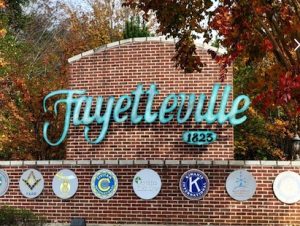The agenda for the Fayetteville City Council was heavier than usual July 21 and included the adoption of a $9.41 million Fiscal Year 2012 budget, passage of an ordinance pertaining to restrictions on the sale of precious metals and the passage of another rule allowing negotiations on impact and sewer proportionate fees.
The $9.41 million General Fund budget that begins Aug. 1 represents a decrease of $169,000 over the current year and will continue the city’s long-time hiring freeze. The budget also anticipates a 6 percent decrease in the local tax digest and a slight increase in sales tax revenues.
The council in August is likely to institute a millage rate roll-up based on the decrease in the city tax digest. That means that properties that have increased in value will see a larger tax bill while those that have maintained the same value or have decreased in value will not.
The reason, said city Finance and Administrative Services Assistant Director Ellen Walls, is that the decrease in the tax digest equates to a drop in the value of a mill from which the millage rate is multiplied to obtain the amount of the tax bill.
Fayetteville was hit hard last year by falling tax digest numbers compared to some areas of the county. That is expected to occur again this year, with the anticipated 4-to-5 percent decrease countywide looking more like 6 percent this year in Fayetteville. The millage rate last year was increased by .29 mills, from a rate of 2.988 to one levying 3.28 mills to offset the decrease in the tax digest and the value of a mill.
The number of city employees on the payroll continues to decrease and the multi-year hiring freeze in still in place. Full-time equivalent positions in 2008 totaled 163 compared to the 136 positions requested for 2012, a difference of 17 percent.
On the revenue side, the largest slice of the pie is sales taxes at 23 percent followed by property taxes at 22 percent, business taxes at 16 percent and fines and forfeitures and franchise fees at 14 percent each.
The largest portion of the expenditures side of the budget is public safety at 67 percent followed by public works at 10 percent, general government at 10 percent, judicial at 7 percent and housing and development at 5 percent.
The City Council at the meeting also adopted an ordinance that would tighten restrictions on people that sell precious metals and on businesses that buy them. The ordinance requires a digital photo and thumbprint of the seller and a 30-day waiting period before the buyer can dispose of the merchandise.
Police Chief Steve Heaton at the June 16 council meeting said the city had approximately 4,500 precious metals transactions from five locations in the last year. Those transactions amounted to approximately $750,000 being paid out to sellers, hesaid.
Heaton prior to the adoption said the ordinance would also require that the digital information obtained at the time of the sale be stored on the LeadsOnline database. LeadsOnline is a national online investigation service. The Fayetteville ordinance also has a $1 fee to be charged to the business for each transaction to offset the $2,800 annual fee for the LeadsOnline service.
Also at the meeting, the council amended the impact fee and sewer proportionate fee ordinances in an effort to help spur economic development.
The two ordinance revisions reduce or waive sewer proportionate fees or impact fees or establish payment plans for economic development activities that would benefit the city.
Citing an example of how the amendments would work, Walls described a developer permitted to extend the city’s sewer system which would benefit more than one property owner. In consideration for the cost of the extension, the sewer proportionate share fees may be reduced, waived or put on a payment plan, she explained.












Leave a Comment
You must be logged in to post a comment.